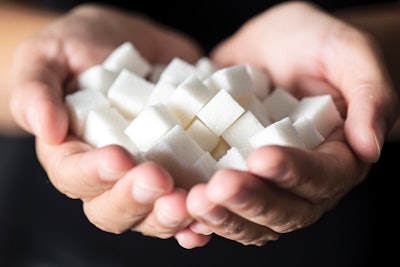
Even if you don’t have a sweet tooth, you probably eat too much sugar (most people do). But how bad is sugar really? Long known as a culprit of weight gain and tooth decay, sugar’s reputation has soured further in recent years as a growing number of studies draw parallels between the American sweet tooth and some serious health consequences. Before you face the overabundance of sweets and alcohol this holiday season, get the scoop about sugar’s effects on your health.
Natural vs. Added
When we talk about sugar, it’s important to recognize the different kinds. The sugar in whole fruit and milk is considered “natural” sugar. But those that are added to food and drinks during processing are called, unsurprisingly, “added sugars.” Sounds simple, but the food industry uses more than 50 different terms on food labels that you might not realize are sugar, such as evaporated cane juice, barley malt and malodextrin. What’s more, even familiar and natural-sounding sweeteners, such as honey, agave nectar and maple syrup, are considered added sugars.
“When you see ‘added sugar’ on a label, it indicates that it has been highly processed and is a highly absorbable sugar,” says Wesley Delbridge, a registered dietitian in Phoenix and spokesman for the Academy of Nutrition and Dietetics. In other words, faster absorption time means the body is likely to convert those sugars into fat rather than into energy. On the other hand, if you eat an apple, your blood sugar will spike because of the apple’s natural sugars, but the apple also contains fiber, unlike sugary beverages, so the body will absorb the sugar more slowly. This is why you hear much more about the evils of added sugar as opposed to natural sugar. But Delbridge recommends keeping an eye on your consumption of natural sugar, too, in packaged foods, such as bread, sweetened dairy products and tomato sauce, as well as in fruit.
Know Your Limits
Consumption of added sugar has dipped in the last decade, but adults still consumed just over 30 percent more added sugar in 2010 than they did in 1977. The American Heart Association’s current recommended daily limit for added sugar is 6 teaspoons for women and 9 for men, but the average person consumes more than twice that. For men 19 and older, the mean consumption of added sugar was 19 teaspoons a day, and women in the same age group consumed 14 teaspoons of added sugar, according to the National Cancer Institute of the National Institutes of Health. Tipping past the healthy daily limit is pretty easy when you consider that one can of Coke contains 10 teaspoons of added sugar, and a 16-ounce vanilla latte from Starbucks contains 35 grams of sugar, or almost 9 teaspoons of it.
Some added sugar in your diet won’t kill you, notes Delbridge, but overdoing it can have detrimental effects over time. An influx of sugar makes it difficult for your pancreas to pump out enough insulin—the hormone that helps the body convert sugar into energy—to keep up with the demand. Consistently elevated insulin will eventually make the body less sensitive to it, which will leave too much glucose, or sugar, in your blood, leading to prediabetes and diabetes.
Sugar and Your Health
While the American Diabetes Association says that sugar consumption doesn’t “cause” diabetes, many experts agree that too much sugar in the diet leaves you ripe for a variety of health issues. That being said, the connection is somewhat complex: There is not a direct correlation between sugar and health problems, but people who eat a lot of sugar tend to weigh more, and being overweight and obese increases your risk for diabetes, heart disease and high blood pressure, among other things. “If you’re overweight, it taxes your body’s organs and systems,” says Delbridge. Complicating matters further, we’re not just talking about cookies and fruity drinks when it comes to the effects of sugar on health; the body converts carbohydrates into sugar as well. “Carbohydrates, such as pasta and white rice, are also a kind of sugar,” says Elisabeth von der Lohe, MD, a professor of clinical medicine and cardiologist at Indiana University Health in Indianapolis, “so they should be limited in the diet.”
Alarmed by the rate of death from heart disease, which peaked in 1950, doctors started raising awareness then about the dangers of saturated fat and heart disease risk. Many people did cut back on fat, but they often ended up eating too much sugar to make up for the loss of flavor. “In the past, we thought saturated fat caused heart disease,” says Dr. von der Lohe. “But newer research shows that glucose or carbs are just as bad and can lead to atherosclerosis,” she says, which is a hardening and narrowing of artery walls that restricts blood flow and increases the risk of heart attack.
More research is needed, but some studies have suggested that “good fats,” including high-quality saturated fat, such as eggs or meat from pasture raised animals, in small or moderate amounts is less harmful to the heart than carbohydrates. In fact, a study published last year in the journal Progress in Cardiovascular Diseases concluded that added sugar, particularly liquid forms, such as high-fructose corn syrup, had a greater impact on coronary heart disease risk than saturated fat did.
The good news? You can incorporate sugar into a healthy diet, Delbridge says. The key is moderation: Eat balanced meals made from whole foods with protein, fiber and a little fat and sugar. And be aware of what you eat. “We all pay attention to our bank accounts and should be doing the same with our physical health,” Delbridge says. “We should be aware of everything going in and out, like we’re a bank.”
What are your thoughts on sugar affecting your health? Let us know in the comments below!
-Virginia Pelley is a freelance writer based in Brooklyn, NY.
[Images: Gettyimages/samarik/istock]
READ MORE:











